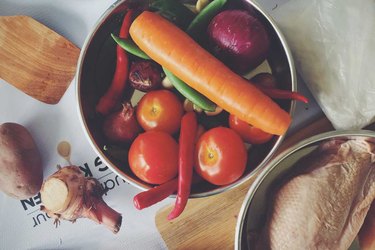The myth about how eating fruit and meat together leads to rotting sugars in the gut? Totally bogus.
Whether they're found in ancient Ayurvedic texts or in weight-loss articles in various consumer mags, food combining recommendations are ubiquitous. The truth is that few have legitimate science behind them, and many are based on misunderstandings of the way digestion works in the human body.
Video of the Day
Video of the Day
"The idea that you have to eat certain foods to optimize digestion is complete and total nonsense," says Dr. Janet Bond Brill, a registered dietitian who holds master's degrees in both nutrition and exercise physiology and a doctorate in exercise physiology. In particular, Brill referred to the idea that eating certain foods together will cause them to putrefy in your body as "a myth that refuses to die."
Read More: 9 Delicious Recipes Made With Healthy Fats
However, it's true that certain nutrients can enhance or decrease the bioavailability of other nutrients and are beneficial in many other ways. Good and bad food combos can be particularly important for people with nutritional deficiencies or who eat a plant-based diet.
We spoke with three nutrition experts to find out which food combining combos you should really avoid and some that can help optimize your health.
BAD COMBO #1: Beans and Red Wine
If you're on a vegetarian diet or are deficient in iron, listen up. You might want to indulge in red wine -- or coffee or chocolate -- on its own. That's because the tannins found in these prevent iron from being absorbed, says Sara Haas, registered dietitian nutritionist. This is particularly pronounced in vegetarian sources of iron, such as beans, dark-green leafy veggies and whole grains. "Don't drink red wine while eating your black bean salad," Haas advises.
BAD COMBO #2: Spinach and Dairy Products
Love your creamed spinach? Or spanakopita? Here's some bad news: "Oxalates are these little compounds that combine with calcium and prevent it from being absorbed," says Sara Haas, registered dietitian nutritionist and spokesperson for the Academy of Nutrition and Dietetics.
If you're on a vegetarian diet or are a menopausal woman or just want to make sure you're absorbing calcium well, you'll want to avoid mixing dairy with oxalate-dense foods like spinach, beets, collards, leeks and parsley. Instead, make creamed spinach with coconut milk, which is also a great ingredient for creamy soups filled with root vegetables and leafy greens.
BAD COMBO #3: Nuts and Tofu
If you're a plant-based eater, you may want to think twice before adding cashews or sesame seeds to your next stir-fry. Phytates — found in nuts, seeds and whole grains — can block the absorption of iron, something plant-based folks need to give extra consideration to when planning their meals. For instance, tofu and other soy products are an easy and protein-packed way for veg-heads to get their iron.
GOOD COMBO #1: Nuts and Oatmeal
Tamara Duker Freuman, a registered dietitian, says that people trying to manage their weight or blood sugar may want to combine starchy whole grains with foods rich in fiber, protein or fat. "If you have diabetes or pre-diabetes, or if you're just prone to hyperglycemia or hypoglycemia or irregularities in your blood sugar," she says, "then how you combine your carbohydrates with fat and protein can make a difference in how quickly or slowly your carbs hit your blood sugar."
That can be something as simple as adding a handful of nuts to your fruit salad or eating your oatmeal with almond butter instead of fruit. Instead of toast with fruit and jam, try toast with peanut butter or avocado and eggs to slow digestion and control your blood sugar.
GOOD COMBO #2: Extra-Virgin Olive Oil and Tomatoes
Tomatoes contain lycopene, a fat-soluble antioxidant that may help prevent tumor growth and reduce the risk of cancer and cardiovascular disease. "If you drizzle a little extra-virgin olive oil on your tomatoes, that will help with the absorption of lycopene from the tomatoes because of this concept of it being fat-soluble," says Dr. Brill. Another option is to serve baguettes with bruschetta, basil and tomato slices, making sure to include olive oil.
GOOD COMBO #3: Avocado and Green Salad
"Vitamin K is an important blood-clotting vitamin," says Sara Haas, registered dietitian nutritionist and spokesperson for the Academy of Nutrition and Dietetics. "It also helps with bone and heart health, and it's one people don't think a lot about." Green leafy vegetables are among the foods highest in this vitamin, and you'll want to eat a healthy fat with them.
"It's in a class of fat-soluble vitamins, meaning you can't absorb vitamin K unless you have a little bit of fat to absorb it and work it into the blood stream." An easy and delicious way to do that is to add avocados or avocado oil to your salad dressing.
GOOD COMBO #4: Kombu and Beans
Kombu, an edible kelp consumed widely in east Asia, has enzymes that help break down the raffinose sugar in beans. Since our bodies can't digest raffinose sugar, the compound leads to intestinal gas. That's where the dark seaweed comes in handy. You might not be familiar with it, but it's often used in Japanese dashi broth or inside onigiri rice balls.
"When you're making beans from dry beans and cooking them, you can throw in some kombu with the dry beans, which lowers the cooking time and helps to de-gas the beans," says Dr. Brill. This way you can have your beans without the Beano.
GOOD COMBO #5: Salmon and Broccoli
The benefits of calcium have been well established. It helps build and maintain strong bones and improves the function of the heart, nerves and muscles. Vitamin D also has mental-health benefits and may even aid in reducing the risk of certain cancers.
"Vitamin D helps with calcium absorption, so if you eat something with vitamin D, it helps you absorb the calcium in other foods," says Sara Haas, registered dietitian nutritionist. So it makes sense to pair vitamin D-rich foods, such as salmon and sardines, with high-calcium foods like bok choy or broccoli or other dark leafy greens. Of course, it doesn't hurt that the combinations are delicious. Bon appetit.
GOOD COMBO #6: Beans and Bell Peppers
Looking to improve your iron absorption? Just add vitamin C. This is particularly important for people on plant-based diets, because iron from meat sources is better absorbed. "Squirting lemon juice on spinach or kale or arugula helps the absorption of iron," says Dr. Brill. Other options include cooking bell peppers with beans, adding tomatoes to lentils or, as dietitian nutritionist Sara Haas recommends, creating a salsa with edamame, onions and strawberries.
What Do YOU Think?
Do you have any delicious recipes that increase absorption of nutrients or stave off blood sugar crashes? Leave your thoughts in the comments!
Read More: How the 5th Flavor Can Help You Lose Weight


